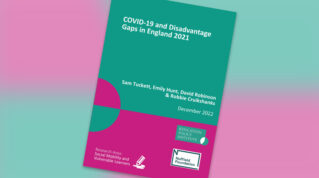Awareness of apprenticeships has declined, mental health has deteriorated and pass rates for adults from BAME communities took the biggest hit during the pandemic, according to a government-commissioned review of the FE sector.
The International Public Policy Observatory (IPPO) published a rapid evidence review yesterday which pulled together studies on the harm done by Covid-19 to further education in 2020.
These are the key findings:
Changes to assessment harmed vocational students more than academic
The first national lockdown in March 2020 saw college and training provider campuses close until the new academic year. Exams were subsequently cancelled, and GCSE and A-level students ultimately received centre-assessed grades (CAGs).
For vocational and technical qualification learners, awarding bodies were left to decide whether they could also receive a CAG, or whether their assessments should go ahead but be adapted or, as a last resort, be delayed.
Using Association of College analysis of “college performance benchmarks”, the IPPO found that pass rates were down by up to 5 per cent in a range of vocational courses including engineering and construction in 2020 compared with 2019.
Meanwhile, there were “significant” increases in A-level pass rates over the same period averaging 10 percentage points.
When looking at the largest learning aims, there were “notable” declines in level 1 diploma construction (5.6 per cent) and transport maintenance (10.7 per cent); level 2 electrical installation (8.1 per cent) and light vehicle maintenance (10.1 per cent).
‘Particularly vulnerable’ FE students hit hardest
Among FE students aged 19 or above, the IPPO found the decline in pass rates had been most notable in students from Black, Asian and minority ethnic communities (3-4 per cent, compared with 1.3 per cent for white students).
When FE student pass rates were “mapped against indices of deprivation, this reveals a ‘class gap’ of 7 per cent between most and least deprived”.
From interviews that supplemented the research review, the IPPO said vulnerable learners were found to have been most disadvantaged by the “absence of close teacher support, loss of study habit and discipline, a loss of ‘agency’ and increased feelings of alienation”.
Decline in awareness of apprenticeships
Closing FE colleges and training providers during the pandemic led to a fall in the number of young people completing apprenticeships in 2020 – down to 25 per cent from 37 per cent in previous years, because their “skills acquisition needed to progress to the next stage could not be verified”.
The number of young people starting new apprenticeships also went down, by 46 percentage points in 2020 compared with 2019, with particular falls within the health and social care, business management and hospitality sectors.
The IPPO review found evidence from a survey of 2,000 parents and young adults conducted by construction firm Redrow of a “decline in the awareness of apprenticeships during the pandemic among potential new students”.
It found that, with less time spent in school, the number of young people who had information on apprenticeships given to them dropped from 63 per cent in 2018 to 57 per cent in 2021, a four-year low.
Mental health and wellbeing of students ‘worsened’
The IPPO found the pandemic increased worry among young people about their “course performance, particularly on vocational courses, opportunities for work placements, and future job opportunities”.
In one survey reviewed, 24 per cent of young people claimed that the pandemic had “destroyed” their career aspirations.
On mental health concerns, 41 per cent of colleges reported a “significant increase” in referrals and 90 per cent of colleges saw an increase in students diagnosed with mental health conditions over the past 12 months.
How will the DfE tackle the issues?
Responding to the report, a DfE spokesperson said: “Our priority is making sure students get the support they need to recover from lost learning and training due to the pandemic. In February we announced a further £102 million to extend the 16 to 19 tuition fund into 2021/22, which will build on the successful approach of this in 2020/21.
“Eligibility for the 16 to 19 tuition fund in 2021/22 is being broadened to include economic disadvantage in addition to low prior attainment. Including these students allows providers to offer tuition to all disadvantaged students who have been impacted by the pandemic, while still maintaining focus on low prior attainment.
“We are also making some adjustments to the fund, based on feedback from providers, to allow some flexibility in the number of students included in a small group for the purposes of the fund and we will be introducing a number of enhancements to strengthen accountability of the tuition fund.”
The spokesperson did not say how those aged over 19 would be supported.

















Your thoughts